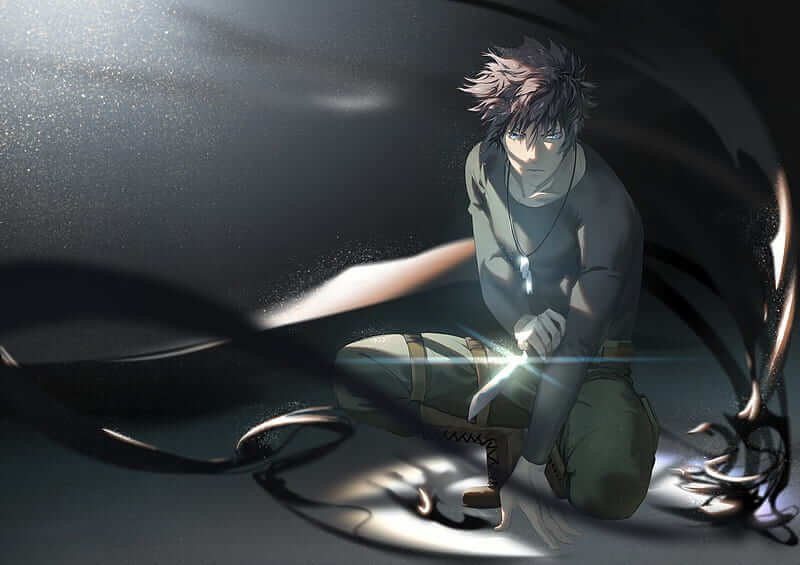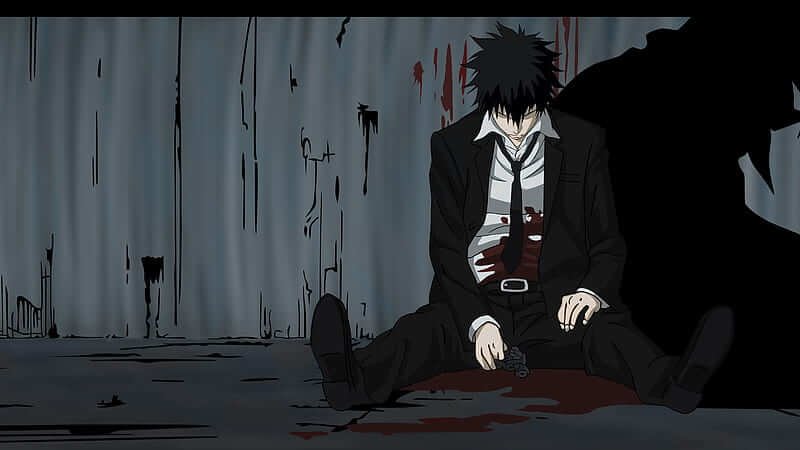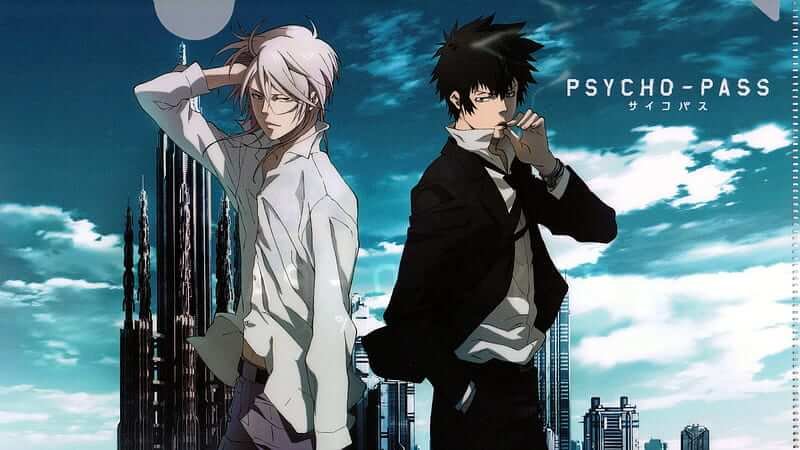Psycho-Pass Anime Review: A Complete Review
Psycho-Pass, a dystopian anime set in a future where individuals’ mental states, personalities, and tendencies are quantified and analyzed through a device known as the Dominator, follows Inspector Akane Tsunemori and her team of Enforcers as they navigate society.
The show dives deeply into the morality of using technology to control crime and its impact on individual freedom and privacy. Villainous characters challenge Akane and her team with thought-provoking ethical dilemmas, forcing them to question their beliefs and the society they serve.
Psycho-Pass offers a compelling and darkly imaginative world, filled with complex characters, intricate plots, and stunning action sequences. The show explores themes of justice, power, and the human condition, making it a thought-provoking and memorable viewing experience.
Psycho-Pass Manga Review
The Psycho-Pass manga series, written and illustrated by Production I.G and first released in 2012, takes place in a futuristic society where individuals’ mental states, personalities, and tendencies are quantified and analyzed through a device known as the Dominator.

The story is set in a dystopian future where crime is at an all-time low thanks to the Dominator, which measures a person’s psycho-pass (mental state) and determines if they are a threat to society.
The manga delves into the complexities of a world where technology controls and monitors individuals and its impact on personal freedom and privacy. The characters are well-developed, with compelling backstories and motivations that drive the narrative forward. The art style is dark, moody, and highly detailed, bringing the world to life with a rich color palette and expertly choreographed action sequences.
Psycho-Pass Anime Review
The Psycho-Pass anime adaptation, produced by Production I.G and first aired in 2012 with a second season in 2014, faithfully represents the manga series, retaining its themes and characters while adding stunning animation and breathtaking action sequences.
The story delves into the complexities of a world where technology controls and monitors individuals and its impact on personal freedom and privacy.
The animation is spectacular, with rich, vibrant colors and detailed, futuristic landscapes. The action sequences are breathtaking and expertly choreographed, making for an immersive viewing experience. The characters come to life with expressive animation and captivating voice acting, making for a well-rounded and highly enjoyable viewing experience.
Psycho-Pass Animation
The Psycho-Pass anime, produced by Production I.G and first aired in 2012 with a second season in 2014, features a dark, moody, and highly detailed animation style. The rich color palette brings the futuristic world to life, and the expertly choreographed action sequences make for a visually stunning viewing experience.
Psycho-Pass Characters
The characters in Psycho-Pass are well-developed and complex, each with unique backstories and motivations that drive the narrative forward. Inspector Akane Tsunemori, the protagonist, is a young and idealistic inspector tasked with navigating the complexities of a society where technology controls and monitors individuals.
Psycho-Pass Plot
The plot of Psycho-Pass is set in a dystopian future where crime is at an all-time low thanks to the Dominator, a device that measures a person’s psycho-pass (mental state) and determines if they are a threat to society.
The show delves into the complexities of a world where technology controls and monitors individuals and its impact on personal freedom and privacy. Villainous characters challenge Akane and her team with thought-provoking ethical dilemmas, forcing them to question their beliefs and the society they serve.
Psycho-Pass Positives
Compelling world-building: The world of Psycho-Pass is dark, moody, and highly imaginative, with a complex network of advanced technology and trained professionals that bring society to life.
Thought-provoking themes: The show explores themes of justice, power, and the human condition, making it a thought-provoking and memorable viewing experience.
Complex characters: The characters are well-developed, with compelling backstories and motivations that drive the narrative forward.
Visually stunning: The animation style is dark, moody, and highly detailed, with a rich color palette that brings the futuristic world to life.
Psycho-Pass Negatives
Slow pacing: At times, the show can feel slow-paced, with long stretches of dialogue that may not appeal to everyone.
Complex plot: The plot can be complex and difficult to follow at times, requiring close attention and careful consideration.
My Opinion
Psycho-Pass is a must-watch for fans of the cyberpunk and sci-fi genres and for anyone looking for an anime that challenges perceptions and leaves a lasting impact. The show offers a compelling and darkly imaginative world, filled with complex characters, intricate plots, and stunning action sequences.

The animation style is visually stunning, and the themes explored are thought-provoking and memorable. While the pace of the show can be slow at times, and the plot can be complex, these are minor drawbacks in an otherwise excellent anime.
Psycho-Pass Anime Review: Frequently Asked Questions
What is Psycho-Pass and Why is it Popular?
Psycho-Pass is a Japanese anime series that explores a dystopian society where a person’s mental state can be measured by a device called the Sybil System.
The series has gained popularity due to its thought-provoking themes and engaging storyline.
What is the Main Plot of Psycho-Pass?
The main plot of Psycho-Pass revolves around Akane Tsunemori, a young inspector who joins the Public Safety Bureau’s Crime Enforcement Division.
Together, they investigate crimes and uncover the dark secrets behind the Sybil System, which raises questions about morality, free will, and the nature of humanity.
What are the Key Themes in Psycho-Pass?
Psycho-Pass explores several key themes, including the ethics of surveillance, the impact of technology on society, and the struggle for individual freedom in a society that values conformity. The series also delves into the psychological effects of trauma and the blurred lines between good and evil.
Who are the Main Characters in Psycho-Pass?
The main characters in Psycho-Pass include Akane Tsunemori, Shinya Kogami, and Makoto Makimura, a brilliant scientist who created the Sybil System. Other notable characters include the enigmatic Inspector Kei Mogami and the charismatic and cunning Shogo Makishima.
Is Psycho-Pass Suitable for All Audiences?
Psycho-Pass contains mature themes, violence, and some suggestive content, making it unsuitable for younger viewers. However, the series has gained a significant following among fans of science fiction and psychological thrillers.
What are the Similarities and Differences between Psycho-Pass and Other Anime Series?
Psycho-Pass shares similarities with other dystopian anime series like Ghost in the Shell and Ergo Proxy, but its unique blend of psychological insights and philosophical themes sets it apart.
How Does Psycho-Pass Portray the Relationship Between Technology and Humanity?
Psycho-Pass portrays technology as a double-edged sword, offering benefits like increased efficiency and security but also raising concerns about privacy, free will, and the erosion of human emotions.
The series highlights the potential consequences of relying too heavily on technology and the importance of balancing it with human intuition and empathy.
What are the Implications of the Sybil System on Society?
The Sybil System, which measures a person’s mental state and likelihood of committing a crime, raises questions about the ethics of surveillance and the potential for abuse.
The series explores the implications of such a system on society, including the erosion of individual freedom and the potential for social control.
How Does Psycho-Pass Address Issues of Morality and Ethics?
Psycho-Pass addresses issues of morality and ethics by presenting complex moral dilemmas and encouraging viewers to question their own values and beliefs.
The series challenges the notion of absolute morality and presents a nuanced view of right and wrong, highlighting the gray areas that exist in real life.
What are the Cultural Significance and Impact of Psycho-Pass?
Psycho-Pass has had a significant impact on popular culture, inspiring numerous adaptations, including video games and films. The series has also sparked discussions about the ethics of surveillance and the potential consequences of relying too heavily on technology.
Is Psycho-Pass Worth Watching?
Psycho-Pass is definitely worth watching for fans of science fiction, psychological thrillers, and thought-provoking themes. The series offers a unique blend of action, suspense, and philosophical insights that will keep viewers engaged and challenged throughout.
Related:



